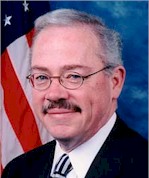
Advocates Split Over Which Threatens Privacy More -
Governments or Commerce
(December 21, 1999) Steve Forbes last week accused the administration of drafting regulations that would allow the government to violate individuals' medical records privacy. He also stated that "the biggest and most serious threat to our privacy comes from a massive federal government ..." This runs counter to the school of thought that it is corporations, not the government, that pose the bigger privacy problem.
Protecting privacy is neither an intense nor partisan issue in Washington politics. However, there are some patterns. Generally, Republicans and conservatives who take an interest in protecting privacy see government as the larger threat. In contrast, Democrats and liberals who take an interest in privacy tend to see businesses as the greater threat.
Rep. Porter Goss (R-FL), the Chairman of the House Intelligence Committee, has sparred with the administration over the signals intelligence operations of the National Security Administration (NSA). Rep. Goss has sought copies of the NSA's own records regarding its assessment of the legality of its these activities.
Rep. Goss wrote a statement in May which was attached to a committee report. In it he criticized the NSA's refusal to give him the records. He also explained that "the privacy interests of the citizens of the United States could be at risk."
 |
|
| Rep. Bob Barr |
Rep. Bob Barr (R-GA), a member of the House Judiciary Committee, has taken a keen interest, not only in the NSA's signals intelligence operations, but a whole host of other government law enforcement activities that threaten individual privacy.
Rep. Barr gave a speech last April in which he cited the NSA's signals intelligence activities, the FDIC's proposed "know your customer" regulations, the proposed national ID card, and roving wiretaps by law enforcement.
In contrast, Rep. Ed Markey (D-MA), the ranking Democrat on the House Telecom Subcommittee, is a leading proponent of passing legislation to regulate business activities that affect online privacy. He is the sponsor of HR 3321, the Electronic Privacy Bill of Rights Act of 1999, which would limit the gathering and compiling personally identifiable information by commercial web site operators.
Rep. Markey has also criticized Intel for its chip design plans. For example, he gave a speech last April in which he stated, "I found the unique identifying technology in the Intel Pentium III, and Microsoft products, very disturbing. I quickly wrote to the CEO of Intel when the Pentium III was unveiled to request a redesign of the chip to better address consumer privacy concerns."
Interest groups which advocate on the issue of privacy also tend split on what poses the greatest threat to privacy, governments or corporations.
For, example, there Phyllis Schlafly, of the pro-family Eagle Forum, a group popular with conservative women. She wrote an editorial on December 8, 1999, that,
"Americans should be increasingly worried about how computer efficiency gives the federal government extraordinary powers to monitor the daily activities of law-abiding Americans. Unknown to most people, government databases are storing all kinds of personal information about every American."
She listed a long litany of government abuses of, or attempts to abuse, individual privacy.
The list continued. Almost everything on it involved government action.
| Related Story: Presidential Candidate Forbes Gives Address on Privacy, 12/21/99. |
Similarly, Steve Forbes gave a major speech on privacy to the Free Congress Foundation in Washington on Thursday, December 16. He focused primarily on government threats to medical records privacy. Nevertheless, his long list of abuses was almost exclusively government actions. It overlapped significantly with Schlafly's list.
In contrast, groups such as Electronic Privacy Information Center (EPIC) and Junkbusters perceive corporations to be a greater threat. Marc Rotenberg, Executive Director of EPIC, and Jason Catlett, President of Junkbusters, held a joint press conference on Friday, December 17.
They released a report titled Surfer Beware III: Privacy Policies without Privacy Protection which criticized e-commerce company's privacy policies.
Jason Catlett said, "The stated policies of most big shopping sites run the gamut from bad to atrocious. People should have the right to buy without being tracked and without having their personal information sold."
Both also commented on the Forbes speech. "Forbes correctly identified that privacy is a vital issue for the next century, but he pointed a finger in the wrong direction," said Catlett. His "comments were exclusively on government."
"The critical privacy issue in the campaign is going to be the expanding use of personal data in the commercial sector," said Rotenberg. However, he added that, "I will fairly credit Forbes for raising the issue."
| See, Tech Law Journal Summary of Online Privacy Bills in the 106th Congress. |
There is also bipartisan activity. There are bipartisan bills in both the House and Senate to impose some regulation of online business's privacy practices. For example, Sen. Conrad Burns (R-MT) and Sen. Ron Wyden (D-OR) are cosponsoring S 809, the Online Privacy Protection Act of 1999. Similarly, Rep. Rick Boucher (D-VA) and Rep. Bob Goodlatte (R-VA) are the lead cosponsors of HR 1685, The Internet Growth and Development Act.